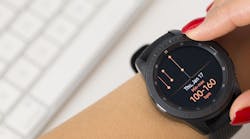In addition to tracking your steps, your wearable might be able to detect COVID-19.
Researchers at the Scripps Translational Institute found that when paired with symptom data, the activity data wearables passively collect can help identify COVID-19 in symptomatic individuals. The results were published in the journal Nature.
More than 30,500 people in the United States enrolled in the app-based study between March 25 and June 7, 2020. Participants reported symptoms and diagnostic test results in the app and had the option to share anonymized activity data from their smart watches and fitness trackers.
Researchers calculated a baseline for each participant’s heart rate, sleep and activity levels. Using that data and self-reported symptoms, they developed a model that was able to predict with 80% accuracy whether a participant who experienced symptoms was likely to have COVID-19. They noted a significant difference in sleep and activity levels for people who tested positive compared to those participants who reported symptoms but tested negative.
“These results suggest that sensor data can incrementally improve symptom-only-based models to differentiate between COVID-19-positive and COVID-19-negative symptomatic individuals, with the potential to enhance our ability to identify a cluster before more spread occurs,” the researchers conclude. “Such a passive monitoring strategy may be complementary to virus testing, which is generally a one-off, or infrequent, sampling assay.”
The findings highlight the fact that about 40-50% of those who test positive for SARS-CoV-2 report no symptoms or are pre-symptomatic. These people are still infectious but because they don’t feel sick, they may not seek testing and likely aren’t self-isolating, making it difficult to stop the spread.
“One of the greatest challenges for preventing transmission of SARS-CoV-2 is the ability to quickly identify, trace and isolate cases before they can further spread the infection to susceptible individuals,” the researchers write. “As regions across the United States start implementing measures to reopen businesses, schools and other activities, many rely on current screening practices for COVID-19, which typically include a combination of symptom and travel-related survey questions and temperature measurements.”
They noted that an elevated temperature is not as common a symptom as once thought, and only about one-third of patients tested positive for COVID-19 at the time of hospitalization. However, nearly one in five Americans wear some kind of wearable, offering ample data collection to determine baseline levels and plenty of opportunity to identify subtle changes that may suggest infection.
Researchers are still recruiting additional patients and hope to further refine their process to become more proactive, even alerting people who are not symptomatic to get tested for possible infection.

